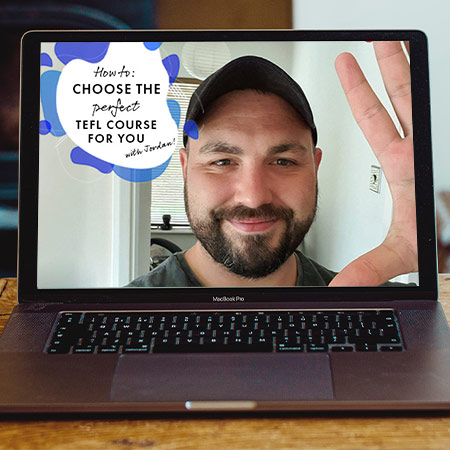Successful online TEFL teacher, Audrey, is 23 years old and does not have a degree. Audrey went live on i-to-i’s Facebook page to talk about how you too can teach English online without a degree. Watch a recording of the full webinar here or read on for edited extracts.
Introducing Audrey
I am 23 years old. I started teaching when I was 22. I did not go to college. I don’t have a degree. I did get my TEFL teaching certificate with i-to-i TEFL.
I decided to teach online when the pandemic hit, so that, no matter what happens, I can work. I want to travel. I can take my iPad and I can go anywhere in the world and work. Today was my big anniversary: I hit 900 hours with PalFish, in seven months.
What you need to teach English online
First of all, to teach English online you need to be fluent in English. You also need a TEFL qualification. I did the Level-3 120 hours course with i-to-i TEFL.
I work from my iPad but for some companies, you need a laptop and a webcam. You have to have the internet – we have online jobs! If my Wi-Fi is down, I turn on the hotspot on my phone. We had a storm once and my Wi-Fi went off. It was a bit crazy but I got back into class.
I use Zoom to teach online because I can share my screen and I am able to write on the screen as well. If I am doing conversational classes, I can also use Skype.
You do not need a degree. I did not have a degree when I was a TEFL teacher in a kindergarten. I do not have it for my online job or my freelance work. I do not have a degree.
Choosing a TEFL course
Your TEFL course will teach you about grammar, about how to teach adults, how to teach kids, everything like that.
I did the Level-3 Course as I had experience with children and in school – I was a volunteer and I was a classroom assistant. The TEFL Diploma and Level-5 Certificate are at a higher level than a Level-3 Course. If you want to teach business English or if you want to teach online, you should pick specific courses that will give you those skills.
It is very important to research the places you want to teach and check their requirements. If you go onto i-to-i’s website, they tell you exactly what you get with each course so you can compare and decide which TEFL course is right for you
TEFL companies that don’t need a degree
I teach with PalFish. I love it. I typed in ‘online teaching companies’ and found that I liked PalFish the best. The biggest thing for me was that I could teach on my iPad as I didn’t want to buy a laptop. There is also Preply, Cambly and Open English – you can work online on all these websites without a degree. PalFish does not recognise South Africans as native English speakers, unfortunately, but i-to-i TEFL has a blog post about the companies that do accept South Africans.
Some people like working for PalFish where the lesson plans are set and then also working for another website where it is more conversational English. I know other people who are working for several companies until they build up enough students to work solidly on one platform.
Unless your site specifies that you can’t have other jobs, you can work for many as you want. But remember that you only want to teach as much as your body can handle. Teaching English is a job that takes a lot of energy. The moment you get tired, your student is going to notice and they are going to lose their energy and learning as well. I think that is something very important to learn.
I would say, stick to two sites at once, maximum. You should research each company to decide which one is best for you. Say you don’t like their interface, then you are not going to enjoy classes. Your energy is not going to be good and your students are not going to have so much fun. My classes are singing, dancing. I put crazy things on my head. We have so much fun but these kids learn. We have a great time.
How to boost your TEFL CV
If you don’t have teaching experience, fill your resume with volunteering, summer camps, theatre, babysitting, cheerleading – literally any human interaction. I filled my CV with my au pair responsibilities and I was a camp counsellor for sixth graders, so I put that in.
If you are going for a company that teaches children and you used to do theatre in high school, mention that. If you are going for adults and business English and you used to manage a store or work for a company, mention that. These are the things that you should be filling into your resume / CV that I think many people forget.
It is not just about experience of this actual job. It is about your life experience. They want to see who you are as a person. Throwing in your volunteering, throwing in your creative side, is absolutely amazing. You are interacting with people online. They want to know that you are a personable person.
Online TEFL interviews
Your interview is very important. You are going to have one shot with each company – you can never have a second first impression. If you have to do a demo class or you are doing a face-to-face Zoom interview, research your company. You want to be able to answer all their questions. You want to be able to blow their mind. A company really appreciates the people that come in and show that they care about their company and don’t just care about getting a job.
Tip number two: look professional. If they have a dress code, follow their dress code. For example, my company has a blue shirt, so I made sure that I had a blue shirt during their mock class. Was it 100% necessary? No – but it shows your future employer that you are ready and that you pay attention to what their job is.
My interview was a mock class. I did not teach it to a student – I taught my monkey. You need to use TPR. You need to have a loud voice, a positive attitude and a smile. Make sure that you are speaking slowly enough so the student or person watching will understand you. If you make a mistake, it is not the end of the world. Act like it didn’t happen and move on.
Research their teachers. I went on YouTube and searched for ‘PalFish interview mock class’. I watched how their successful teachers did the interview, how they taught their classes and any tips they gave.
Go for it! One company might say, ‘No’ but that doesn’t mean the next company won’t say, ‘‘Yes.’ Just like anything in life, if you are going to apply for a job, there is a chance you won’t get it but there are a million other jobs out there that you might get.
Becoming a freelance TEFL tutor
If you’re a freelance TEFL tutor you work for yourself. You create your own lesson plans. You have to market yourself. You will really be doing it on your own – but you have people like me and i-to-i TEFL. You have great online resources as well.
If you live in a foreign country (or even if you know someone in a foreign town where they don’t have native English speakers) you can go onto Facebook, type in the town on groups or pages and then post an ad. If you live in a native English-speaking country, there are companies like iTalki where you use the site to market yourself but you set your own prices.
If you’re writing a bio, I recommend you talk about your experience, talk about the TEFL classes that you teach, how you teach them, what you focus on, how you adapt to each person. Talk about yourself as well – not just yourself as a teacher but also your interests.
I do not have a website. I have Instagram @travelrichmoneypoor but that’s more to reach out and connect with teachers. However, I know people that have found students through their websites and from Instagram.
I posted on Facebook: ‘Hello everyone. My name is Audrey and I am a 23-year-old English teaching living in [my town]. I have experience as a camp counsellor, as an au pair and a bilingual teacher in a school in Milan. Here are some things that you will find in my classes. I can teach children, adult English.’ I posted a nice picture of me as a teacher and I got 20 messages and 13 actual students.
You can work for an online TEFL company and also do your freelancing. I think it is smart to do something that is going to give you more experience rather than waiting around for instant success. It normally takes six to eight months before you have a full set of clients. Of course, it could be sooner but building your own freelancing can take time.
Online TEFL pay
If you’re working for a company, your online TEFL pay will most likely start at $10 an hour but can go up. I earn $22 an hour plus bonuses and usually make anywhere from $2,000 (if I am working 20 days a month) up to $3,000. It depends on how much you work and how much you want to put into it. When I was in school for 40 to 45 hours per week, I made 1,288 Euros per month.
If you’re freelancing, base your rate on everyone else’s going rate and your experience. I recommend not being the highest but do not go super low and work for nothing. Also, think about what is going to make you successful. Is it going to be one hour where someone pays you $50 or is it going to be four hours where you’re paid $25 for each hour? I started at 15 Euros but I should have gone for 20 to 25 Euros. In Milan you can go for 50 Euros plus. You have to feel it out. You can always start at 15 Euros and start to raise it up.
As a freelancer, I’m paid in two ways: through bank transfer and through PayPal. If you are shouting out your services through a company, make sure your students pay you through the company for their first lesson. If they become a repeat student, you can switch them over. You want to cover yourself.
Lesson planning
Usually, I plan my lessons the day before. I do not have a big book of pre-made lessons. I tailor each lesson to the individual student.
I have a girl who has problems with pronunciation. We spend the entire lesson doing vocabulary and speaking because we want to master her pronunciation. For her, I plan lessons that are going to include things like drilling and flashcards, as they are going to get her to practise repeating the same words over and over again until she masters them.
For my adult student, we are doing test preparation. I set up grammar questions for her that she has to figure out. There are other students where I teach actual vocabulary lessons. First, they will learn vocabulary, then we will go down into sentence structure, then we will go down into conversation based on it.
I always try to speak to my students in English. As a teacher, you should have enough tricks up your sleeve to make them understand – whether that is rewording a point or showing them a video. Props are also important when you are teaching online. If I’m teaching kids, I use things like stuffed animals. For adults, I use realia or PowerPoints. If you really need to, you can use Google translate. It happens. It is not always going to be perfect.
i-to-i has brand new teaching resource packs which are great. They are like a pre-lesson kit and have some lesson plans that are already set up. That is a great thing to start with until you feel comfortable doing your own lesson plans.
Go for it!
Teaching online is not as hard as you think. I recommend just doing it. There is never going to be a moment that you feel 100 per cent like, ‘I am ready to take on the world.’ No matter who you are or how confident you are, the first step is going to be scary. I felt awkward for my first five lessons on PalFish because did I really have a clue? After a while, you get comfortable.
I want you to go and get your TEFL, to go and live out your dreams, as cheesy as it sounds. I moved countries. I fell in love with this country. It changed my whole outlook on life. I want that same thing to happen for you. I want to hear you say, ‘I’ve got my TEFL. I want to take on the world.’ It might be scary but you have got this. I can’t wait to see how successful all you guys are.



